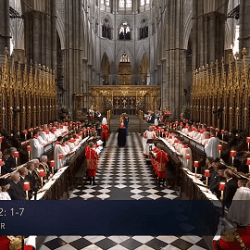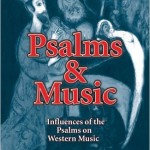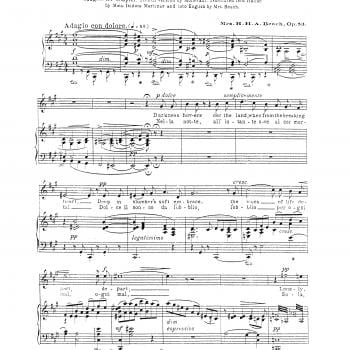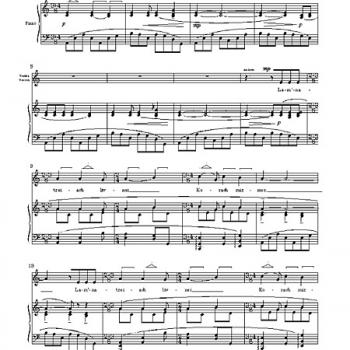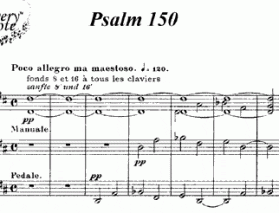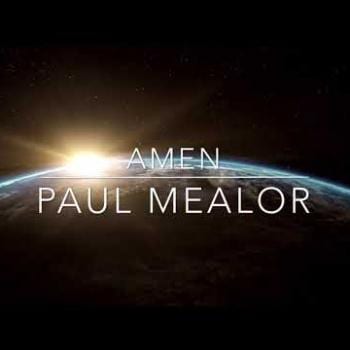I have a document that is now 34 pages long in Word that is a place for making note of compositions I come across that set or otherwise intersect directly with a biblical text. I have been trying to decide what to do with it. Clearly if I had foreseen how it would grow I would have made an Excel or Google spreadsheet. I may still do that, but what is really needed is a database of music related to the Bible, not only indicating the texts that a song is related to but whether it is a more-or-less direct setting of words from the Bible, a paraphrase, an expansion on a biblical story, or merely contains an allusion. Perhaps something like the Deus Ex Musica database project for non-choral sacred music. Anyone have time and interest to create something like that? If so, here are some you can start with. Sorry for not having compiled them in a more orderly fashion…
Genesis/Creation[1]
Genesis Suite
Joseph Haydn, Creation
Jean-Francois Laseur, La mort d’Adam
Franz Baur, Genesis ; Amartema – Der Sündenfall
Darius Milhaud, La creation du monde, op.81 ; Reves de Jacob, op.294
Aaron Copland, In The Beginning[2]
Thomas Adès, In Seven Days[3]
Vicente Barrientos Yepez, Creationem[4]
Charles Wuorinen, Genesis[5]
Larry Alan Smith, Symphony No.2 “Genesis/Antietam”[6]
Genesis, “In the Beginning”
Jerry Bock and Sheldon Harnick, The Apple Tree, Act I: The Diary of Adam and Eve
Xavier Montsalvatge, El Arca de Noé
Oscar Navarro, El Arca de Noe
Richard Strauss, Josephslegende
Robert Starer, Joseph and His Brothers; Va’ahavta
Anne Dudley, The Testimony of John
Gabriel Jackson, “In The Beginning Was The Word”; also (in addition to others mentioned in this document) Magnificat and Nunc Dimittis (Truro Service); Ecce venio cito; Psalm 112: Laudate Pueri
Knut Nystedt, The Word Became Flesh op.162
Enjott Schneider, In Principio Erat Verbum
Elinor Remick Warren, “Abram in Egypt”
Benjamin Britten, Canticle II, Op. 51, “Abraham and Isaac”
Igor Stravinsky, The Flood, Abraham and Isaac
Franz Schubert, Hagar’s Lament
Arvo Pärt, Sarah was Ninety Years Old
Schoenberg, Die Jakobsleiter
Psalms[7]
Psalm 150 reconstructed[8]
Halleluyah betziltzelei shama (performed by Shoshanim)[9]
Jewish
*Barukh Habba (Psalm 118:26-29, on the album Jewish Voices in the New World)
Giacomo Meyerbeer, Psalm 86, Psalm 124[10]
Salomone Rossi, Shir hammaalot leDavid (Psalm 124)
*Louis Lewandowski, Psalms 16, 21, 23, 25, 36, 37, 39, 42-43, 46, 51, 62, 67, 84, 85, 90, 100, 103 (Enosh, vv15-17), 121, 130, 134, 150[11]
Julius Chajes, Psalm 134; The 142nd Psalm
*Isadore Freed, Psalm 8
Salomon Sulzer, Psalm 133
Bonia Shur, Psalm 23
Herbert Fromm, Psalm 23; also Song of Miriam, many other works
*Srul Irving Glick, Psalm Trilogy
*Darius Milhaud, 3 Psalms of David, Op. 339
Hans Schanderl, Psalm 90
Nicola LeFanu, Verses from Psalm 90[12]
Alfred Rose, Psalm 92
Eric Zeisl, Requiem Ebraico[13] (also Jacob and Rachel)
*Leo Rosenbluth, Psalm 93
Miriam Gideon, Adonai Malakh (Psalm 93); Psalm 128
Yehudi Wyner, Shiru Ladonai (Psalm 96)
*Leonard Bernstein, Chichester Psalms
* Herman D. Koppel, 3 Psalms, op. 48[14]
Abraham Kaplan, Psalms of Abraham
Aharon Harlap, Tehilim (Psalms)
Jean Berger, Psalm 23, “The Lord to me a shepherd is”
Heinrich Schalit, Psalm 23: The 23rd Psalm
Maurice Jacobson, The Lord is My Shepherd
Martin Kalmanoff, The Lord is My Shepherd (Psalm 23)
Avner Dorman, Psalm 67
Robert Strassburg, Psalm 117
Greg Knauf, Psalm 117 “Laudate Dominum omnes gentes”
Ioseb Bardanashvili, Psalm 121
Leon Algazi, 3 Chants Hebraiques Traditionnels: No. 3. Psaume 144
Jack Gottlieb, Shout for Joy and Psalmistry
Gershon Kingsley, Jazz Psalms
Aaron Copland, Four Motets[15]
- Klein, Psalm 150 (from Hear O Israel)
Samuel Adler, Psalm 23; A Psalm Trilogy
Robert Starer, Psalms of Woe and Joy; Two Sacred Songs; A Psalm of David (13th Psalm); others
Abraham Kaplan, Glorious
Shlomo Carlebach
Debbie Friedman
Arnold Schoenberg, De Profundis Psalm 130 op.50b
Richard Danielpour, String Quartet No. 7, ‘Psalms of Solace’
Orthodox
Rachmaninov, Vespers (excerpts)
Taneyev, Sergei, On The Reading of a Psalm (based on Psalm 50)
Viktor Kalinnikov, Blazhen Muzh
Liadov, Perelozheniya iz obikhoda – No.9 “Khvalite Gospoda s nebes”
Alexander Zemlinsky, Psalm 13 Op.24
Alexander Arkhangelsky, Psalm 141
*Cyrillus Kreek, Psalms 22, 104, 121, 137, 141
Vladimir Fainer, Accedite ad eum (Ps.33:6)
*Igor Stravinsky, Symphony of Psalms
*Alan Hovhaness, Make Haste, Op.86; Out of the Depths, Op. 142, No. 3; “Psalm 130”, Cantate Domino, Op. 385; “Psalm 143, Hear My Prayer, O Lord, Op. 149” (and others)[16]
Carmen Petra-Basacopol, Din Psalmii lui David
Sofia Gubaidulina, Jauchzt vor Gott, De Profundis[17]
John Tavener, Psalm 121
Dinos Constantinides, Concerto of Psalms (inspired by Psalms 19, 130 and 150)
Catholic
Gregorian Chant (e.g. Psalm 121)
*Hildegard of Bingen, Dixit Dominus (Psalm 109/110); Spiritus Sanctus (Psalm 110/111)
Daniel Selichius, Opus novum
William Byrd, Laudibus in sanctis. Psalm 150; Hear My Prayer O Lord; O Lord Rebuke Me Not; Haver Mercy Upon Me O God; Teach Me O Lord; I Will Give Laud[18]
Orlando di Lassus, Psalmi Davidis poenitentiales[19]
Jan Pieterszoon Sweelinck, Genevan Psalter (Psalms 1, 2, 6, 7, 24, 25, 27, 36, 47, 77, 90, 96, 98, 112, 135, 137, 141, 150) [excerpts]
Kaspar Förster, Benedicam Dominum[20]
Peter Philips, Ascendit Deus
Alberik Mazak, Psalms 109-112, 116[21]
- A. Mozart, Laudate Dominum K339
Nicolas Bernier, Laudate Dominum quoniam, Miserere mei Deus
Franz Schubert, Psalm 23, Op. 132, D. 706
Joseph Gabriel Rheinberger, 3 Psalmen op. 40
George Palmer, 3 Psalms
Théodore Dubois, Cantate Domino
Imant Raminsh, Cantate Domino
Joseph Vella, Salm 89, Op.43[22]
Marty Haugen, Psalms 16, 23, 66, 136
Protestant[23]
*Martin Luther, Psalm 46 “A Mighty Fortress”
*Ali Ufki (Wojciech Bobowski), Genevan Psalter: Psalms 2 and 6
Philipp Dulichius, Motets[24]
Andrzej Hakenberger, Pelplin Tablature[25]
Louis Bourgeois, Ainsi qu’on oit le cerf bruire, “Psalm 42” (from Pseaumes Octantetrois de David, mis en rime Françoise par Clément Marot et Théodore de Bèze)
Claude Goudimel, Psalms (40, 137)
Claude Le Jeune, O Dieu, je n’ay Dieu fors que toy, “Psalm 63”; Du fons de ma pensee, “Psalm 130”
Paschal de l’Estocart, Reveillez vous chacun fidele, “Psalm 33”; Estans assis aux rives aquatiques, “Psalm 137”
Nicolas Vallet, Psalm 8
Melchior Franck, Laetatus sum (Psalm 121)
Crato Bütner, Psalm 113 (Laudate Pueri Dominum), Psalm 147
Leonhard Paminger, Domine, ne in furore tuo (Psalm 38); In exitu Israel de Aegypto (Psalm 114/115); Psalm 110
Johann Gottlieb Naumann, Psalms 96 and 103
Michael Praetorius, Das ist mir lieb, “Psalm 116”
Heinrich Schütz, Psalmen Davids samt etlichen Moteten und Concerten, Op. 2, SWV 22-47; Der 100. Psalm, SWV 36
Henry Lawes, Psalm VIII
Orlando Gibbons, “O Clap Your Hands” (Psalm XLVII); “O Lord in Thy Wrath” (Psalm 6:1-4); “Lift Up Your Heads” (Psalm 24); Psalm 47
John Mundy, Sing Joyfully
Constantijn Huygens, Pathodia Sacra et Profana
David Moritz Michael, Der 103te Psalm
Pelham Humfrey, O Give Thanks Unto The Lord; O Lord My God; By the Waters of Babylon; also Magnificat and Nunc Dimittis
Georg Friedrich Händel, Coronation Anthems (Let Thy Hand Be Strengthened; The King Shall Rejoice)
Hermann Goetz, Psalm 137
Noel Edison, Psalm 121; Psalm 137
Kurt Thomas, Psalm 137 op.4
Philip James, By the Waters of Babylon
Havergal Brian, By the Waters of Babylon
Robert Ross, Song of Exile
Healey Willan, O Praise The Lord (various Psalms plus verses from Habakkuk)
Adrian Batten, O Praise The Lord (Psalm 117:1-2)
Charles Hylton Stewart, Psalm 23; Psalm 80
David Willcocks, Psalm 131
John Henry Maunder, ‘Praise the Lord, O Jerusalem’
Edward Elgar, Give unto the Lord (Psalm XXIX), Op. 74; Psalm 48 op.67
Charles Villiers Stanford, Psalms 147, 148, 150[26]
Hubert Parry, I was glad when they said unto me, Op. 51; Psalm LXXXIV; “Psalm 122”
Herbert Howells, Behold, O God Our Defender; God is gone up with a merry noise; Like as the Hart; Requiem (incorporates Psalm 23 and 121)
Arthur Bliss, Meditations on a Theme by John Blow[27]
Lennox Berkeley, The Lord is my shepherd, Op. 91, No. 1
Will Todd, Te Deum: No. 4. Psalm 23, “The Lord Is My Shepherd”
Howard Goodall, The Lord is My Shepherd; O Pray for the Peace of Jerusalem / rogate pacem (Psalm 122) [28]
Louise Talma, Pray for the Peace of Jerusalem (from Voices of Peace)
Leo Sowerby, Psalm 122, Psalm 130
Ina Boyle, Seven Psalms; “Wilt not Thou, O God, go forth with our Hosts?”; “He That Hath Eternal Being”; ‘Blessed Be the Lord, for He Hath Showed Me His Marvelous Kindness’[29]
*Howard Hanson, The 150th Psalm
Carson Cooman, Psalm 29 Op.643; Ps.104 Op.659; Ps. 118 Op.658; Mercy and Truth Op.938
Conrad Susa, The God of Love My Shepherd Is
Bruce Neswick, I Will Set His Dominion in the Sea; Hearken to My Voice, O Lord, When I Call
*Carl Nielsen, Three Motets
Rihards Dubra, Domine Dominus noster
Jaakko Mantyjarvi, I Was Glad
Gottfrid Berg, Huru ljuvliga aro icke dina boningar (How amiable are thy tabernacles); Om de yttersta tingen: No. 2. Lar oss betanka huru fa vara dagar aro (So teach us to number our days)[30]
Daniel Pinkham, Jubilee and Psalm; Miserere Mei Deus; Psalm Set, Psalm 24; others
*David Hurd, Miserere Mei, Deus (Psalm 51)
Gwyneth Walker, Psalm 23[31]
Richard Yardumian, Symphony No. 2 “Psalms”
Steven Faux, The Psalms Project
Romantic to Modern (not grouped according to composers’ religious affiliation)
Felix Mendelssohn, Psalms 2, 22, 42, 43, 114, 115
Nicolai Otto, Psalm 31, “Herr, auf dich traue ich”; Psalm 97, “Der Herr ist Konig”
Anton Bruckner, Psalm 112, 114, 150
Dvorak, Biblical Songs
Zoltan Kodaly, Geneva Psalms 114, 121, 150, Psalmus Hungaricus op.13
Max Reger, Psalm 100 Op.106
Marek Jasiński, Psalm 100; Cantus finalis
Dan Forrest, Jubilate Deo
Florent Schmitt, Psalm XLVII, Op. 38
E. J. Moeran, ‘Praise the Lord, O Jerusalem’
Charles Martin Loeffler, By the Rivers of Babylon, Op. 3
Emile Goué, Psalm XIII, Psalm CXXIII
Eric Delamarter, Psalms 46, 68, 80, and 104; also The Testimony of John
Lili Boulanger, Psalms 24, 129, 130: Du fond de l’abîme
Arthur Honegger, Mimaamaquim
Joachim Raff, Psalm 130 : De Profundis
Henry Wallford Davies, Psalm 130 : De Profundis ; also Lift Up Your Hearts, Op.20 ; The Temple ; Blessed are the Pure in Heart
Virgil Thomson, De Profundis[32]
Marcin Tadeusz Łukaszewski, De Profundis
Łukasz Urbaniak, De profundis
Raminta Serksnyte, De Profundis
Philippe Chamouard, De Profundis
Miłosz Bembinow, Beatus vir…
Romuald Twardowski, Chwalitie Imia Gospodnie; Chwali, dusze moja, Gospoda
Józef Świder, Laudate pueri; Deus in adiutorium; Laudate Dominum; Dixit Dominus; Beati omnes (Psalm 127)[33]
Michał Zieliński, Laudate Dominum
Andrzej Bielerzewski, Cantate Domino canticum novum
Paweł Łukaszewski, Two Funeral Psalms
Philippe Hersant, Psalm 130, “Aus tiefer Not”
Ernest Bloch, Prelude and 2 Psalms (114 and 137)
Pauls Dambis, Psalm 19, Psalm 22, Psalm 121
Sven-David Sandström, Psalm 139, “Oh Lord, you have searched me”[34]
*Victoria Bond, “How Lovely is Your Dwelling Place” (Psalm 84)[35]
*Evelyn Simpson-Currenton, My Soul Hath Refuge in Thee “Psalm 91”
Marga Richter, Psalm 91
Jacob Druckman, Psalm 93
Jean Langlais, Psalm 111, “Beatus vir”
*Charles Ives, Psalms 14, 24, 25, 42, 54, 67, 90, 100, 135, 150
Pavel Haas, Psalm 29, Op.12
Fartein Valen, Salme 121
Margaret Meachem, Lift Thine Eyes unto the Mountains
Bruce Babcock, Be Still[36]
Arvo Pärt, Peace upon you, Jerusalem
Virpi Leppänen, Kiittäkää Herran nimeä (Praise ye the name of the Lord)
Sisask Urmas, “Laudate Dominum” from Gloria Patris[37]
Krzysztof Penderecki, Aus den Psalmen Davids
Philip Glass, Psalm 126, “Hymn” from Akhenaten (includes Psalm 104)
*Benjamin Britten, Psalm 150
John Sanders, Psalm 150
Colin Mawby, Psalm 150
Virgil Thomson, 3 Antiphonal Psalms; also “5 Phrases from The Song of Solomon”
George Rochberg, 3 Psalms
Robin Orr, Songs of Zion
Ēriks Ešenvalds, Psalm 67
Paul Creston, Psalm 23
Randall Thompson, The Lord Is My Shepherd
Allen Pote, The Lord is My Shepherd
Bo Holten, Psalm 23, 104[38]
Daniel Asia, Psalm 30
Kenneth Leighton, “Lift Up Your Heads, O Ye Gates”
Gregory Zduniak, Psalm 96: Today Is Born Our Savior
Pamela Decker, Psalm 102, Psalm 139
Karel Boleslav Jirák, Psalm 23 for Chorus and Orchestra
Imant Raminsh, Psalm 23, 121
*Daniel Manneke, Psalm 121
David Briggs, Psalm 121
Leevi Madetoja, Psalm 121
Einojuhani Rautavaara, Psalm 23, Psalm 130
Whitman Brown, Psalm 23
David Goodenough, Psalm 133
Bruce Babcock, Be Still
Roxanna Panufnik, Love Endureth (from Psalm 136); also Deus est Caritas
Vytautas Miškinis, Dilexi, Laudate pueri Dominum, Exultate Deo, Thoughts of Psalms[39]
Stanislaw Szczycinski, Missa de Angelis: Psalm 91, Pater noster
Pawel Łukaszewski, Psalmus 120, Psalmus 129[40]
Wolfram Wagner, Ad te, Domine: Psalm 27 for Soli, Choir and Orchestra
Michael John Trotta, The Lord Is My Shepherd; Psalm 145; Psalm 150; also Set Me As A Seal
Jack Beeson, 3 Settings from the Bay Psalm Book
*Ross Lee Finney, Pilgrim Psalms
Ned Rorem, 2 Psalms and a Proverb; Praise the Lord, O My Soul
*Michael Ostrzyga, Deus in adjutorium (Psalm 70); Dixit Dominus (Psalm 109); Lauda Jerusalem (Psalm 147)
Enjott Schneider, Das ist mine Freude (Ps.73:28)
*Javier Busto, Laudate pueri (Psalm 112)
Sebastian Schwab, Nisi Dominus (Psalm 126)
*David Dzubay, Cantate Domino (Psalm 98)
Mordecai Sandberg, Psalm 130
Robin Estrada, Cæli enarrant[41]
*Deborah Pritchard, I Will Lift Up Mine Eyes Unto The Hills[42]
Grace Mary Williams, Two Psalms; Psalm 150[43]
Bruce Mahin, Whitman Psalms
John Cage, Harmony No. 6. Psalm 17
Iša Krejčí, Little Funeral Music for Alto, Viola, Violoncello, Double Bass and Piano to Texts of the Psalms and František Halas’ Poem “Old Women” (1933, rewritten 1936); Trio for Violin, Violoncello and Piano with a song for a female voice to the text of a Psalm
Dubrovay László, A halál félelmei (Circumdederunt me)
Kurt Estermann, “digression : memoria”
Frank La Rocca, I Will Lift Mine Eyes
Goffredo Petrassi, Psalm IX
Erkkila, Vesa, Minun sieluni halajaa sinua
Tomas Peire Serrate, Confitebor Tibi Domine
Robert Vuichard, Psaume Huictisme de Clement Marot[44]
Michael Hurd, Praise Ye the Lord; O Come Let Us Sing Unto the Lord
Don Walker, Psalms 8, 26, 96, 100, 121, 133, 134; also Magnificat
Elsa Barraine, Deuxième Prélude et Fugue (based on a Jewish Psalm melody)[45]
James Cohn, 5 Psalm Dances Op.50; 4 Psalms for Women’s Chorus and Piano, op.20
Secular
*Ralph Vaughan Williams, O Clap Your Hands[46]
*John Rutter, The Lord is My Shepherd;[47] O clap your hands; Lord, thou hast been our refuge; O Lord, thou hast searched me out; Wells Jubilate, Psalmfest, Psalm 150[48]
Rock, Pop, and Contemporary Christian[49]
U2, “40”
By The Rivers of Babylon (Boney M, Sublime)
Ian White, Psalms
Phil Keaggy, Psalm 121
Shane and Shane, Psalms 13, 27, 34, 45, 46, 51, 118, 143, 145[50]
Chris Tomlin, Psalm 100
Louise B. Calixte, Psalm 69
The Psalms Project http://thepsalmsprojectband.com/mission[51]
The SHIYR Poets, Psalms
Jessi Colter, The Psalms
Moses and the Exodus
Franz Schubert, Miriam’s Song of Triumph
- F. Händel, Israel in Egypt
- P. E. Bach’s Die Israeliten in der Wuste
Hubert Parry, ‘Long Since in Egypt’s Plenteous Lands’
Thomas Linley’s The Song of Moses
Gioacchino Rossini, Mosè in Egitto
Anton Rubinstein, Moses[52]
*Nathaniel Dett, The Ordering of Moses[53]
Max Bruch, Moses, op.67
Herman D. Koppel, Moses, op.76[54]
Darius Milhaud, Moise, Op.219, “Opus americanum No.2”[55]
Stefan Wolpe, The Man from Midian Suite
Arnold Schoenberg, Moses und Aron
Elmer Bernstein, The Ten Commandments
The Prince of Egypt
Franz Waxman, Joshua
Debbie Freedman, Miriam’s Song
Ruth[56]
Luise Adolpha Le Beau, Ruth: Biblical Scenes Op.27
Cesar Franck, Ruth, eglogue biblique (also The Beatitudes[57]; Psalm 150)
Mario Castelnuovo-Tedesco, Naomi and Ruth, Op. 137
James Niblock, Ruth and Naomi
Georg Schumann, Ruth op.20
Lennox Berkeley, Ruth op.50
*Franz Waxman, Ruth
Sharon Farber, “For Wherever You Go, I Will Go” (from Bridges of Love)
Song of Songs[58]
*Giovanni Pierluigi da Palestrina, Song of Songs
Jacobus Clemens non Papa, Ego flos campi[59]
Thomas Morley, O Amica Mea (also Out of the Deep, Psalm 130)
Emmanuel Chabrier, La Sulamite
Paul von Klenau, Sulamith
*Percy Grainger, Love Verses from The Song of Solomon, King Solomon’s Espousals
Jean Yves Daniel-Lesur, Le Cantique des Cantiques
Patrick Burgan, Cantique des Cantiques[60]
Patrick Hawes, Song of Songs
Lazare Saminsky, Second Hebrew Song Cycle Op.13: The Song of Songs
Rued Langaard, From the Song of Solomon, BVN 381
Sid Robinovich, Song of Songs
Jorge Liderman, The Song of Songs
Nicola LeFanu, Il Cantico dei Cantici II
Ralph Vaughan Williams, Flos Campi Suite
Benjamin Britten, My Beloved is Mine
Stephen Paulus, Arise My Love
David Bednall, Rise Up My Love
Stephen Danker, Song of Solomon (Symphony No.3)
Jonathan Leshnoff, Song of Songs[61]
Zdeněk Lukáš, Písně Šalomounovy (see also Z nejkrásnějších písní Šalomounových; Mundum est cor meum; Quis potest dicere, op. 346; Psalm 126; Ave Maria; other works)
*Pablo Casals, Nigra Sum
Sebastian Schwab, Nigra Sum
Healey Willan, Rise Up My Love
Carson Cooman, The Rose of Sharon; Rise Up My Love
James Rolfe, Garden; O That You Would Kiss Me[62]
William Walton, Set Me As A Seal Upon Thy Heart
Max Helfman, Set Me As a Seal; The Voice of My Beloved
Nico Muhly, Set Me As A Seal
Rene Clausen, Set Me As A Seal
Naji Hakim, Set Me As a Seal Upon Your Heart
Anatolijus Šenderovas, “Simeni kahotam al libecha” (“Set me as a seal on Your heart”), “Paratum cor meum” (“My heart is fixed”), “Shma Israel”, David’s Song (instrumental), Song of Shulamith (instrumental), Exodus
Vytautas Miškinis, In lectulo meo
- C. Kostić, Pesma nd Pesmama
Ella Milch-Sheriff, Dark am I
Sergei Slonimsky, Solomon’s Song of Songs (also David’s Psalms)[63]
Forrest Pierce, The Twelve Kisses
*Sinéad O’Connor, “Dark I Am Yet Lovely,” from the album Theology[64]
Samson and Delilah
Handel
Saint-Saens[65]
“Samson and Delilah” aka “If I Had My Way I’d Tear the Building Down” (traditional, performed by Blind Willie Johnson, Rev. Gary Davis , The Grateful Dead, Shirley Manson, and others)
Regina Spektor
Film score
Salome with and without Words[66]
Richard Strauss, Salome
Alexander Glazunov, Introduction and Dance of Salome
Akira Ifukube, Salome (ballet)
Florent Schmitt, La Tragedie de Salome
Jules Massenet, Hérodiade
Joseph Achron, Danse de Salome
Matthias Pintscher, Hérodiade-Fragmente
Madame Edwarda, Salomé
David[67]
Händel, G. F., Saul
Mussorgsky, Tsar Saul
Egil Hovland, Saul, Op.74[68]
Ján Levoslav Bella, Saul und David op. 7[69]
Nicolas Gombert, Lugebat David Absalon
Josquin des Prez, Lugebat David Absalom
*Thomas Tomkins, When David Heard
Thomas Weelkes, “When David Heard” and “O Jonathan, Woe Is Me” [70]
William Billings, David’s Lamentation
*Eric Whitacre, “When David Heard”
Norman Dinerstein, “When David Heard”
Mario Castelnuovo-Tedesco, Le danze del Re David
Artur Honneger, Le Roi David
Ståle Kleiberg, David and Bathsheba[71]
Alfred Newman, David and Bathsheba
Kirmo Lintinen, David and Bathsheba[72]
David Barlow, David and Bathsheba[73]
King David (musicals by Tim Rice, Eyal Bitton)[74]
Randall Thompson, Last Words of David
*Stephen Melillo, David
The Nativity[75]
John La Montaine, Erode the Greate, a Pageant Opera in 2 acts, Op. 40
Paul Hindemith, Das Marienleben op.27
Ave Maria: Mikołaj Zieleński, *Hildegard of Bingen, Josquin des Prez, Adrian Willaert, Jacques Arcadelt, Francisco Guerrero,[76] Robert Parsons, J. S. Bach, *Franz Schubert, *Anton Bruckner, Antonin Dvořak, Théodore Dubois (3 settings), Joseph Bonnet (op.2 and op.6 No.2), *Edward Elgar Op.2 No.2, Gustav Holst, Alan Hovhaness (Op.100 No.1a), Igor Stravinsky, Vladimir Fainer, Ferenc Farkas, R. Nathaniel Dett, Peter Benoit Op.1, Alexander Albrecht, Ladislav Stanček, Mikuláš Schneider-Trnavský, Štefan Németh-Šamorínsky,[77] Viliam Figuš-Bystrý (Dve Ave Maria op. 94), Frico Kafenda, Ján Móry, Imants Ramiņš, Rihards Dubra, Robert Parsons, Vicente Barrientos Yepez, Leone Sinigaglia, Paul Creston op.57, Fartein Valen, *Morten Lauridsen, *Knut Nystedt (op.110), *Vladimir Vavilov (attributed to Giulio Caccini), Einojuhani Rautavaara, Michael Head, Colin Mawby, Gabriel Jackson, Scott Solak, Andrew Smith,[78] Hugh Benham, *Karl Jenkins, Joshua Himes, David MacIntyre; Cecilia McDowall;[79] also Pau (Pablo) Casals, Rosarium Beatae Virginis Mariae; Anthony Milner, Salutatio Angelica op.1.
Hildegard of Bingen, Magnificat
Cristobal de Morales, Magnificat (Octavi toni)
Orlando di Lassus, Magnificat tertii toni, Magnificat octavi toni
Michael Praetorius, Magnificat per omnes versus super ut re mi fa sol la
Jehan Titelouze, Magnificat (too many to list!)
Thomas Morley, Thomas Tomkins, Magnificat and Nunc dimittis (Fifth Service)[80]
Thomas Tallis, William Byrd, Magnificat and Nunc Dimittis (Fauxbourdons)
Marcin Mielczewski, Magnificat primi toni a 12
Isfrid Kayser, Magnificat
*Francois Couperin, Magnificat
Antonio Vivaldi, Magnificat
J. S. Bach, Magnificat in D Major BWV243
Arnold Bax, Magnificat
Alan Hovhaness, Magnificat
Ruth Watson Henderson, Magnificat[81]
Arvo Pärt, Magnificat
John Rutter, Magnificat
Fredrik Sixten, Magnificat
Krzysztof Penderecki, Magnificat
John Wood, Magnificat in G
Basil Harwood, Magnificat in A flat
Wolfram Buchenberg, Magnificat
Joep Franssens, Magnificat
Peter Benoit, Magnificat
James Burton, Magnificat
Forrest Pierce, Magnificat
Michael Kurth, Magnificat[82]
Damijan Mocnik, Magnificat
Sisask Urmas, Magnificat
Einojuhani Rautavaara, Magnificat
Goffredo Petrassi, Magnificat for Soprano, Chorus and Orchestra
Paul Chihara, Magnificat
Kim André Arnesen, Magnificat anima mea
Charles-Francois Gounod, An Evening Service
Orlando Gibbons, Magnificat and Nunc Dimittis (Second Service; Short Service)
William Child, Magnificat and Nunc Dimittis
Charles Wood, Magnificat and Nunc dimittis in F ‘Collegium Regale’
John Henry Maunder, Magnificat & Nunc Dimittis in C, D, and G
*Charles V. Stanford, Magnificat and Nunc Dimittis (several: in Bb, C, F, G, A)
E. J. Moeran, Magnificat and Nunc Dimittis in D
*William Walton, Magnificat and Nunc Dimittis
George Dyson, Magnificat and Nunc Dimittis (Three: in C minor, D Major, and F Major)[83]
William Mathias, Magnificat & Nunc dimittis (Jesus Service)
John Ireland, Evening Service (Two: in C and F), Benedictus[84]
Edmund Rubbra, Magnificat and Nunc Dimittis
Kenneth Leighton, Magnificat and Nunc Dimittis ‘Collegium Magdalenae Oxoniensis’
Jeremy Filsell, Magnificat and Nunc Dimittis from ‘Windsor Service’
Richard Pantcheff, Evening Service in D Major, “The Whitchurch Canticles”; St. Paul’s Service; Evening Canticles, “Aedes Christi”
Herbert Sumsion, Magnificat and Nunc Dimittis (in A, D, and three in G)
Bernard Rose, Magnificat and Nunc Dimittis[85]
Elisabeth Lutyens, Magnificat and Nunc dimittis
*Ruth Biggs, Magnificat and Nunc Dimittis
Caleb Burhans, Magnificat and Nunc dimittis
Michael Tippett , Magnificat and Nunc dimittis ‘Collegium Sancti Johannis Cantabrigiense’
Ēriks Ešenvalds, Magnificat and Nunc dimittis
James Whitbourn, Magnificat and Nunc dimittis, “Collegium Regale”
David Ashley White, Magnificat and Nunc dimittis[86]
Hugh Benham, Evening Service in G Major
John Tavener, Magnificat and Nunc dimittis “Collegium Regale”[87]
Paul Patterson, Magnificat and Nunc Dimittis, Op.59
John Høybye, Magnificat and Nunc Dimittis
Judith Bingham, Edington Service
Tim Knight, Unison Canticles; Evening Canticles (also Ave Maria; Rise Up, My Love; Beati Mortui; Let Us Now Praise Famous Men)
Naji Hakim, Magnificat, Nunc dimittis[88]
Adrienne Albert, Magnificat, Nunc Dimittis[89]
Jan Pieterszoon Sweelinck, Cantique de Siméon
Josquin des Prez, Nunc Dimittis
Palestrina, Nunc Dimittis
Gustav Holst, Nunc Dimittis
Herbert Howells, Nunc Dimittis
Pawel Lukaszeski, Nunc Dimittis
Peter Tiefenbach, Nunc Dimittis
*Hreiðar Ingi, Nunc Dimittis
Sigurður Sævarsson, Nunc Dimittis
Arvo Pärt, Nunc Dimittis
John Ashton Thomas, Nunc Dimittis
Jane Marshall, Song of Simeon “Nunc dimittis”
Sungji Hong, Nunc Dimittis; also Pater Noster; The Lord Is My Shepherd
Bálint Karosi, Nunc Dimittis; Ne Timeas Maria[90]
Andrew Smith, Magnificat a 4; Nunc dimittis servum tuum
Trond Kverno, Canticum Zachariae (also Ave Maria)
Rachmaninov, Vespers Op.37 No.5 & No.11
Jules Massenet, La Vierge[91]
Johann Mattheson, Christmas Oratorio
Hector Berlioz, L’Enfance du Christ, op.25
Gerald Finzi, In Terra Pax[92]
Randall Thompson, The Nativity According to St. Luke
Paul Constantinescu, The Nativity – Byzantine Christmas Oratorio
Mario Castelnuovo-Tedesco, Evangélion
Heinrich Schütz, Weinachtshistorie (Historia der Geburt Jesu Christi) SWV 435 (The Christmas Story)
*G. F. Händel, Messiah
Sven-David Sandstöm, Messiah
Hector Berlioz, L’enfance du Christ, Op. 25
CARISSIMI, G.: Jephte / BERTALI, A.: La strage degl`innocenti
Antonio Bertali, La strage degl`innocenti
Scelsi, Three Latin Prayers (Ave Maria, Pater Noster)
Marty Haugen, Annunciation/Magnificat
Demetrio Navarro, Canticle of Our Lady (Magnificat)
Vasyl Barvinsky, Ne Plach Rakhyle (“Don’t Cry, Rachel”)
The Lord’s Prayer[93]
*Jacobus Gallus (Handl), Pater Noster
*Robert Stone, The Lord’s Prayer (earliest setting in English)
Leonhard Paminger, Pater Noster
Gioseffo Zarlino, Pater Noster, Ave Maria
Tomás Luis de Victoria, Pater Noster
Cristóbal de Morales, Pater Noster
*Josquin des Prez, Pater Noster
Guillaume de Machaut, Messe de Notre Dame : Pater Noster
Schütz, Vater unser, der du bist im Himmel
Herwig Reiter, Vater unser
Nicolai Otto, Pater Noster op.33
*Albert Hay Malotte, The Lord’s Prayer
John Caldwell, Gabriel Jackson, Bernard Rose
Charles-Francois Gounod, Pater Noster
Joseph Bonnet, Pater Noster Op.8 No.1
Franz Liszt, Pater Noster
Ferenc Farkas, Pater Noster
*Albert de Klerk, Pater Noster
*Giuseppi Verdi, Pater Noster
*Maurice Durufle, Notre Pere
*John Tavener, The Lord’s Prayer; Notre Pere
Ernst Krenek, 5 Prayers, Op. 97
Felicia Donceanu, Rugăciunea Domnească
John Ireland, Communion Service in C Major: Pater Noster (note: in English)
Leonard Bernstein, Mass: The Lord’s Prayer
Thomas Bloch, Missa Cantate: Pater Noster
Alan Hovhaness, The Lord’s Prayer op.35
Andrejs Jurjāns, The Lord’s Prayer
Arvo Pärt, Vater unser
*Peteris Vasks, Pater Noster
Pekka Kostiainen, Pater Noster
Michael Bojesen, Pater Noster
Dan Locklair, Pater Noster
Arnold Strals (recorded by Sister Janet Mead), The Lord’s Prayer
*Marcin Gumiela, Pater Noster
Naji Hakim, Pater Noster
Leoš Jánaček, Otce nas (The Lord’s Prayer), JW IV/29
*Stravinsky, Otche Nash
Rimsky-Korsakov, Lord’s Prayer
*Valentin Silvestrov, Otche Nash (from Diptych)
*Apostol Nikolaev-Stroumsky, Отче на́шъ
Nicolai Kedrov, Отче на́шъ
Peter Dinev, Отче на́шъ
Dobri Khristov, Otche Nash No.2
*Alfred Schnittke, 3 Sacred Hymns, No.3. Otche nash
D. Ljubojevic, Oče naš
Dimitri Tchesnokov, Pater Noster
*Richard Einhorn, Voices of Light: Pater Noster (with film)
Einojuhani Rautavaara, Herran rukous (The Lord’s Prayer)
Peter Maxwell Davies, The Lord’s Prayer
Toby Young, The Lord’s Prayer
Michael G. Cunningham, The Lord’s Prayer, Op.6d
Hugh Benham, The Lord’s Prayer
Daron Hagen, “Our Father” (Second Movement of Little Prayers)
Kevin Raftery, Dimitte nobis
**Frode Fjellheim, Pater Noster[94]
Anúna, Pater Noster
** Christopher Tin, Baba Yetu
The Crucifixion of Jesus[95]
- P. E. Bach, 30 Geistliche Gesange mit Melodien, Book 2, Wq. 198, H. 752: No. 29. Jesus in Gethsemane
Michael Berkeley, Gethsemane Fragment (instrumental)
Hjalmar Borgström, Jesus in Gethsemane, Op. 14 (instrumental)
Volker David Kirchner, Gethsemani; also Schibboleth
Teizo Matsumura, To the Night of Gethsemane (instrumental)
Bert Breit, Meditationen
Simon Vincent, Meditations on Christ in the Garden of Gethsemane; Stations of the Cross
Gottfried August Homilius, So gehst du nun (St. Mark Passion)
Charles Wood, St. Mark Passion
Reinhard Keiser, Markuspassion
Kurt Thomas, Passionmusik nach den Evangelisten Markus op.7
Adolf Brunner, Passionsgeschichte nach dem Evangelisten Markus
Osvaldo Golijov, St. Mark Passion
Théodore Dubois, Seven Last Words of Christ
Patrick Burgan, Seven Last Words of Christ[96]
Daniel Pinkham, Saint Mark Passion; The Last Seven Words of Christ
Paul Carr, Seven Last Words from the Cross[97]
Knut Nystedt, Jesu sieben Worte, Op. 171
Enjott Schneider, Sieben letzte Worte Jesu (also Organ Concerto No.2: Hiob; Three Biblical Stories; Crucifixus; Salome; others)
Johannes Heroldt, Historia Des Leidens Und Sterbens Unsers Herrn Und Heilands Jesu Christi aus dem H. Evangelisten Mattheo mit sechs Stimmen
Johann Heinrich Rolle, St. Matthew Passion
Hans Peter Türk, Siebenbürgische Passionmusik
J. S. Bach, St. Matthew’s Passion and/or St. John’s Passion
Georg Philipp Telemann, Lukas Passion 1728; Der Tod Jesu
Heinrich Schütz, Lukas-Passion
Rudolf Mauersberger: Passionsmusik nach dem Lukasevangelium
Penderecki, St. Luke Passion
Calliope Tsoupaki, St. Luke’s Passion
Kjell-Mork Karlsen, St. Luke Passion; St. John Passion; Markuspasjon; Orthodox St. Matthew Passion[98]
Teodoro Clinio, Passio Domini Nostri Jesu Christi Secundum Joannem
Fasch, Passio Jesu Christi
Arvo Pärt, St. John Passion
Sofia Gubaidulina, Johannes-Passion and Johannes-Ostern
Guido Mancusi, Johannespassion
James Macmillan, St. John Passion; St. Luke Passion; Seven Last Words from the Cross[99]
*Ēriks Ešenvalds, Passion and Resurrection
Frédéric Ledroit, La Passion du Christ selon Saint Jean
Carl Heinrich Graun, Der Tod Jesu
Hugo Distler, Choral-Passion, op.7
Johann Wilhelm Hertel, Der Sterbende Heiland
Robert Kyr, The Passion according to 4 Evangelists
Peter Breiner, The Story (oratorio)[100]
Hermann Reutter, Die Passion in 9 Inventionen, Op. 25
Bohuslav Martinu, Greek Passion
Tan Dun, Water Passion[101]
Torbjorn Dyrud, Out of Darkness
Adolphus Hailstork, Crucifixion
John Debney, The Passion of the Christ
Frank Martin, Golgotha; Polyptyque, Six images de la Passion du Christ
*Richard Danielpour, The Passion of Yeshua[102]
John Ireland, “Greater Love Hath No Man”
Francis Poulenc, Tenebrae factae sunt
Harrison Birtwistle, The Last Supper
Patrick Hadley, A Lenten Cantata
Stevan Stojanović Mokranjac, Страснa седмица (Strasna sedmica = Passion Week)
Haydn, Seven Last Words of our Redeemer on the Cross
Schütz, Seven Last Words of our Savior on the Cross
Michael Finnissey, Dum transisset Sabbatum[103]
Judith Bingham, Jesum quaeritis Nazarenum (also “Prelude and Voluntary” inspired by the Emmaus Road story)
Bruce Springsteen, Jesus Was An Only Son
Gospels, Teaching of Jesus
*Pärt, “Which was the son of…”, “The woman with the alabaster box”; “Tribute to Caesar”; “Zwei Beter” (also Ja ma kuulsin hääle… [And I heard a voice…])
Alessandro Stradella, San Giovanni Battista
Helge Burggrabe, Jehoschua (Rotes Oratorium)[104]
Martin Emslie, Omega and Alpha
Thomas Tallis, If Ye Love Me
Paul Mealor, If Ye Love Me; also Ave Maria; De Profundis; Jubilate Deo; The Beatitudes; The Lord Bless You and Keep You; The Selwyn Service; “All wisdom cometh from the Lord”
Benjamin Britten, Cantata misericordium, Op. 69
Ralph Vaughan Williams, Dives and Lazarus (plus original folk song)
Hugo Alfvén, Den forlorade sonen (The Prodigal Son) Suite
Keith Green, Prodigal Son Suite, Road to Jericho, The Sheep and the Goats
Kurt Atterberg, De Favitska Jungfrurna, op.17 “The Wish and Foolish Virgins”
Jazeps Vitols, Jezus pie akas (Jesus by the Well)
Christopher Wright, “The Bread of Life”; “Hymn of Salvation” (also Magnificat and Nunc Dimittis; “Song of Praise”)
E. J. Moeran, “Blessed are those servants”
Philip Stopford, “In My Father’s House”; also Ave Maria
Vladimir Ivanovich Martynov, The Beatitudes
Damijan Mocnik, Blagri (Beatitudes)
Zoltan Kodaly, Jezus es a Kufarok
Will Todd, God So Loved The World; Passion Music
Francis Pott, Christus[105]
Patrick Burgan, Noli me tangere[106]
Graham Ross, Ascendo ad Patrem meum
Mason Bates, Sirens (5th movement, From The Book of Matthew)
Omerror Dawson (Arr. Mervyn Warren), Come Unto Me
James Lee III, “Stones and Bread”[107]
Alemdar Karamanov, Cycle of Symphonies 11-14 “Accomplished” (and many others)
Wisdom, Epistles, Apocrypha and More
Jesús Guridi, “Lamento e imprecación de Agar”
Andrea Clearfield, Women of Valor
*Elizabeth Swados, Bible Women; Esther: A Vaudeville Megillah
Giacomo Carissimi, Jephte
Darius Milhaud, Cantate des proverbes
Wolfram Wagner, Proverbia[108]
*Leo Kraft, A Proverb of Solomon
James Rolfe, Four Anthems for Four Seasons; Under the Sun
*The Byrds, “Turn, Turn, Turn”
*John Rutter, To every thing there is a season
Steven Winteregg, Reflections on Quoheleth
Stefan Węgłowski, Kohelet
Paul Patterson, Ecclesiastes (from Requiem, Op.19)
Anatoly Korolev, Ecclesiast
Ernst Toch, “Vanity of Vanities”; Jephta Rhapsodic Poem, Op 89, Symphony No 5[109]
Granville Bantock, Vanity of Vanities; The Song of Songs; In Praise of Famous Men (from Two Choruses)
William Byrd, Cunctis diebus
*Hubert Parry, The Soul’s Ransom; Judith; Job
Arthur Honegger, Judith[110]
Alexander Serov, Judith
Siegfried Matthus, Judith
William Schuman, Judith
Philip Sawyers, Songs of Loss and Regret No. 7. From the Wisdom of Solomon
David Holsinger, Deborah’s Triumph/Jael’s Revenge
Frederick Jacobi, Hagiographa[111]
Ralph Vaughan Williams, Job – A Masque for Dancing
Petr Eben, Hiob
Wolfram Wagner, Hiob[112]
Peter Michael Hamel, Oh, Erde…
Luigi Dallapiccola, Job
Dave Brubeck, The Commandments and The Gates of Justice
Lukas Foss, Lammdeni, Song of Songs, Song of Anguish
Edward Bairstow, The Lamentation
*Ernst Krenek, Lamentatio Jeremiæ Prophetæ, Op. 93
* Peter-Anthony Togni, Lamentatio Jeremiæ Prophetæ[113]
Pablo Casals, O vos omnes
Rene Clausen, O vos omnes
G. F. Händel, Belshazzar, HWV 61; Judas Maccabeus
*Jean Sibelius, Belshazzar’s Feast (Belsazars gastabud), Op. 5
*William Walton, Belshazzar’s Feast
Giuseppi Verdi, Nabucco[114]
John Knowles Paine, St. Peter op.20
Mendelssohn, Paulus
Dyson, St. Paul’s Voyage to Melita
Jan A.P. Kaczmarek, Paul, Apostle of Christ
Naji Hakim, Saul de Tarse (Oratorio)
Sulo Salonen, 22 evankelimotettia; Ala pelkaa, Maria; Frukta icke, Maria
Jacobus Vaet, Pascha nostrum immolatus est Christus
Joseph Samson, Pascha nostrum immolatus est Christus
Paul Creston, Corinthians XIII
Vincent Persichetti, Love
Richard Rodney Bennett, These Three
Joni Mitchell, Love
Edward Elgar, The Apostles, The Kingdom
Andreas Raselius, Stephanus
Harvey Schmidt, Philemon
Kurt Weill, The Eternal Road
Fanny Mendelssohn-Hensel, Oratorium nach den Bildern der Bibel; Hiob
*Patrick Gowers, Viri Galilaei
Gabriel Jackson, In All His Works
Ecce Sacerdos Magnus (Anton Bruckner, Edward Elgar)[115]
Let Us Now Praise Famous Men – versions by *Edmund Rubbra,[116] Roberta Bitgood,[117] Ralph Vaughan Williams, Gerald Finzi
Franz Baur, Ex Sapientia
*Randall Thompson, Requiem
*Brahms, Ein Deutsches Requiem
Jacob Druckman, Vox Humana
Antonio Caldara, Motets
Sylvie Bodorová, Juda Maccabeus
Prophets
Mendelssohn, Elijah
Malcolm Lipkin, Naboth’s Vineyard
Rihards Dubra (and Jacobus Handl), Duo Seraphim
Edward Elgar, The Spirit of the Lord is Upon Me
Michael Horvit, “The Prophecy of Amos,” “God Is With Us,” “You Shall Love The Lord Your God”
Jonathan Dove, Seek Him that Maketh the Seven Stars
Marga Richter, Seek Him
John Stainer, I Saw The Lord
Matthew Martin, I Saw The Lord
Lori Laitman, And I Will Bring Them
Michael Scherperel, Et introibunt in speluncas petrarum
Johannes Sigl, Refugium II
Rudolf Tobias, Des Jona Sendung
Charles Villiers Stanford, “For lo, I raise up”
Hugo Cole, Jonah
Max Stern, Behold, the Days Come (Cantatas on Biblical Prophecies)
Bob Dylan, All Along the Watchtower
Miloslav Kabeláč, Symphony No. 8, Op.54 “Antiphons” (text from Daniel)
The End of the World[118]
Anthony Pitts, Seven Letters
Herbert Howells, Blessed are the Dead
James Whitbourn, “He carried me away in the spirit” and “Pure river of water of life”[119]
Rued Langgard, Antichrist/The End of Time
Franz Schmidt, Das Buch mit sieben Siegeln (The Book With Seven Seals)
Hilding Rosenberg, Symphony No.4 “Johannes uppenbarelse”
*Messiaen, Quatuor pour le fin de temps
Daniel Pinkham, Revelation Motets
Pierre Henry, L’apocalypse de Jean
Marcin Gumiela, Apocalypse
Knut Nystedt, Apocalypsis Joannis, Op. 155
Kjell-Mork Karlsen, Apenbarings-Meditasjoner (Meditations on Revelation), Op. 155[120]
Boris Arapov, Revelation of St. John the Theologian
Poul Ruders, Thus Saw Saint John
Edgar Bainton, “And I Saw a New Heaven”
Julian Wachner, “Behold the Tabernacle of God”[121]
Patrick Hawes, Revelation[122]
Cristian Bence-Muk, Apocalipsa
Reginald Haber, “Holy, Holy, Holy”
Paulin Michael Mills, “Thou Art Worthy”
Adrian Howard and Pat Turner, “Salvation Belongs To Our God”
Iron Maiden, “The Number of the Beast”
Simon Khorolskiy, Знамение Сына (The Sign of the Son) combines a variety of apocalyptic texts especially from the Gospels and Revelation[123]
https://garyhastert.wordpress.com/2015/04/03/allusions-to-the-book-of-revelation-in-rock-music/amp/
https://www.amazon.com/Theology-Music-Worship-Derived-Revelation/dp/0810829894
Multiple Texts
Anthony Milner, The Water and the Fire[124]
Margaret Allison Bonds, “Scripture Reading”
Einojuhani Rautavaara, Vigilia
James Lentini, Three Sacred Meditations
Johan Franco, Seven Biblical Sketches
Bruno Bjelinski, Drei biblische Legenden (for trumpet and piano, texts not clearly indicated)
Other resources (general)
http://hebrewsongs.com/bible_songs.asp
http://www.psalmistry.com/
Karen Tanaka, Water of Life
Bjorn Korsan Hoemsnes, Chili Celeste (Mighty Heavens) [unsure which biblical text – can anyone help?]
There is so much here, and so much has been written on the topic. I will however note two resources here that it would be easy to miss in that plethora. First, an open access book, Sacred Sound and Social Change: Liturgical Music in Jewish and Christian Experience, edited by Lawrence A. Hoffman and Janet R. Walton. See also the section on Bible and music in Claude Savart and Jean Noël Aletti (eds.), Le Monde contemporain et la Bible. Editions Beauchesne, 1985.
Footnotes:
[1] Also relevant: Olivier Greif’s Cello Concerto, “Durch Adams Fall.”
[2] Also his Four Motets.
[3] https://www.youtube.com/watch?v=n2B4KOGyTTk
[4] Playlist on composer’s website along with settings of the Lord’s Prayer and Ave Maria http://vicenteby.webs.com/workswithaudioscore.htm
[5] Has also set Psalm 39.
[6] Also Psalm 42
[7] There are more settings of Psalms than can be mentioned, never mind included in the course. Other composers include Benedetto Marcello, Henry Purcell, Joseph Corfe, Edward John Hopkins, Matthew Camidge, William Child, George C. Martin, John Barnby, Henry Thomas Smart, James Turle, T. Rogers, John Goss, Frederick Alfred Harvey, Thomas Tomkins, George Bennett, Samuel Sebastian Wesley, G. B. Arnold, Edward C. Bairstow, Charles Harford Lloyd, Walter Galpin Alcock, O. H. Peasgood, Thomas Attwood Walmisley, Martin Neary, Percy Carter Buck, Emilis Melngailis, Percy Whitlock, Henry Walford Davies, Walter Parratt, Michael Joncas, Jenö Takács (in the People’s Mass Book), Bernard Rose, Ivor Atkins, Ruth Watson Henderson, Donald Waxman, and Zavel Zilberts, Michael Joncas. See also the psalms adapted to familiar hymn tunes by Timothy and Julie Tennent: http://psalms.seedbed.com/
[8] See also this video about the method for deducing pitch from markings in the Hebrew text: https://www.youtube.com/watch?v=BUwo1xh7u8E
[9] In the Naxos database. http://butler.naxosmusiclibrary.com/sharedfiles/booklets/SHO/booklet-Sho-049.pdf
[10] Also Pater Noster, Jephtha’s Vow
[11] Also V’sham’ru (Exodus 31:16-17)
[12] “The Spirit Moves” by LeFanu also draws on the Psalms. http://www.nicolalefanu.com/resources/programmenotes/note-versesfrompsalm90.pdf
[13] This work is a setting of Psalm 92.
[14] Listen also to other settings of Biblical texts by the same composer.
[15] https://www.aaroncopland.com/works/four-motets/
[16] http://www.hovhaness.com/hovhaness-vocal-works.html
[17] https://blog.oup.com/2013/10/sofia-gubaidulina-light-darkness/
[18] Also “Christ Rising Again” and many others
[19] Too many works by this composer to list all of them!
[20] Also set by Tomás Luis de Victoria (Psalm 33:1 and 118:132,145)
[21] Also Pater Noster, Magnificat, Magnificat anima mea Dominum
[22] Also Ave Maria Op.74, Magnificat, other works.
[23] Important in the history of the United States is the Bay Psalm Book, the first book printed in the Americas.
[24] Includes a number of texts in addition to Psalms.
[25] Hakenberger was a Catholic employed by a Lutheran church in Gdansk.
[26] Psalms are also included in his Bible Songs op.113.
[27] Psalm 23 provides the headings. He has also composed Mary of Magdala F.31.
[28] Also A new heart, a new spirit; Every purpose under heaven; Marborough Canticles; Invictus: A Passion. http://works-files.s3.amazonaws.com/b59c5261-a741-45db-8916-9842e2bf7c3d
[29] Other compositions include “The Transfiguration” and ‘He Will Swallow up Death in Victory’ http://www.inaboyle.org/new-page/
[30] Also listen to his Ave Maria (No.3 in his 3 Latinska hymner).
[31] The works “There is Joy in the Morning,” “Ever With Me,” and “Prayer of Compassion” combine words with Psalms with other lyrics. Walker is a Quaker.
[32] Also note Lera Auerbach’s De Profundis Violin Concerto No. 3.
[33] Also Magnificat, Pater Noster. The foundation named for him lists Psalms 8, 24, 66, 70, 84, 127, 132, and 150 among his compositions. https://jozefswider.pl/en/katalog-utworow/page/4/
[34] Other relevant works include “Kom till mig (Come to Me)”; “En ny himmel och en ny jord”; “Sanger om karlek (Songs of Love)”; and his new setting of “Messiah.”
[35] https://www.youtube.com/watch?v=DWrFWRfFkWM See also the composer’s notes in Leneman and Wallfish.
[36] http://www.musicbybrucebabcock.com/be-still.html
[37] Laudate Dominum-Oremus-Deo Gratias from Gloria Patri (24 Hymns for mixed choir) https://www.youtube.com/watch?v=5YajzFaUS04
[38] Also listen to his “Wisdom and Folly.”
[39] Has also set Pater Noster, Ave Maria
[40] Also composed Pater noster, Nunc dimittis, Ave Maria, and Adventgebet.
[41] Most of the text is from Psalm 18, with Matthew 7:12 added at the end.
[42] https://soundcloud.com/deborah-pritchard/i-will-lift-up-mine-eyes-unto-the-hills-live-recording Other works, such as Lord’s Prayer, Ave Maria, and The Angel Standing In The Sun may also be found on the composer’s Soundcloud page.
[43] Also The Song of Mary; Benedicite; and sketches of a work Simon the High Priest
[44] https://soundcloud.com/robert-vuichard-composer/psaume-huictiesme-de-clement
[45] https://musictheoryexamplesbywomen.com/examples/fugue-no-2-complete-elsa-barraine/
[46] http://www.societyarts.org/arts-journal/online-edition/136-online-edition-vol-27-no-1/336-ralph-vaughan-williams-spiritual-vagabond
[47] His Requiem includes both Psalm 130 and Psalm 23.
[48] There are many other works by Rutter that set Biblical texts, including “The Lord Bless You And Keep You,” “I am with you always,” and Visions (two of the four movements feature texts from Isaiah and Revelation).
[49] Others include David Haas, The Goodness of God, “Psalm 34”;
[50] See the artists’ website for discussion of some of their psalm settings. https://theworshipinitiative.com/wiu_courses/inside-psalms-two/wiu_lessons/psalm-46
[51] This should not be confused with the Solo Dei Gloria Psalms Project, and indeed it might be instructive to compare the two. http://sdgmusic.org/music/psalms-project
[52] Hear also his Sulamith, Der Thurm zu Babel, Die Maccabäer, Christus, and others.
[53] A dissertation on the piece can be found here: http://digitallibrary.usc.edu/cdm/ref/collection/p15799coll17/id/211215#co_view_contents See also his 8 Bible Vignettes.
[54] Also listen to his Psalms, Biblical Songs, and 4 Love Songs on the Song of Songs.
[55] Also note his treatments of the stories of Esther and David.
[56] “Music and Librettos as Midrash” http://www.sbl-site.org/publications/article.aspx?ArticleId=491
[57] https://www.thomaslloydmusic.com/beatitudes
[58] See the compilation Das Hohelied der Liebe by Singer Pur for more settings from different centuries, by Dominique Phinot, Ivan Moody, Leonhard Lechner, Guillaume Dufay, Brian Elias, Jean Richafort, Heinrich Schutz, Joanne Metcalf, John Plummer, Ludwig Senfl, and Wilhelm Keller. See also the settings by Hieronymus Praetorius, Nicolas Gombert, Tomas Luis de Victoria, John Forest, Giulio Belli, Cornelius Canis, Heinrich Isaac, Clemens Morel, and Robert White. Salamone Rossi, The Songs of Solomon (Hashirim asher lishlomo), should not be mistaken for a setting of this.
[59] Also Vox in Rama, Magi Veniunt
[60] http://www.patrick-burgan.com/en/portfolio-items/cantique-cantiques-2014-4-female-voices/
[61] See also his Eytz Chaim (Tree of Life), a meditation on Proverbs 3:18, 13, 17; as well as Zohar (oratorio) and HaMelekh, both on Jewish mystical texts.
[62] A section of his Four Anthems also derives from Song of Songs
[63] See other setting as well as much more in Kenneth Jaffe, Solo Vocal Works on Jewish Themes: A Bibliography of Jewish Composers. https://ebookcentral.proquest.com/lib/butler/detail.action?docID=1032164
[64] Other tracks on the album are also of interest, such as “If You Had a Vineyard.”
[65] See also his Psalm CL “Praise Ye The Lord” and The Promised Land.
[66] Other individuals and texts have been treated instrumentally. See Kuhnau’s 6 Sonata, Dett’s 8 Bible Vignettes, and Jaromir Weinberger’s Bible Poems for Organ. More on the Enoch Seminar website here: http://www.4enoch.org/wiki4/index.php?title=Category:Salome_(subject)
[67] See also the Biblical Triptych by Jenő (Eugene) Zádor, the movements of which are “Joseph,” “David,” and “Paul.” James Lee III composed “Yoshiyahu – Sinfonia Concertante for Violin and Orchestra “ as a musical exploration of the story of Josiah. https://www.youtube.com/watch?v=mFnDqZhOjJM
[68] Also Bli hos oss (Stay with us), Op. 87, No. 3; Loven og profetene (The Law and the Prophets); Sennepskornet (The Mustard Seed), Op. 25, No. 10; How Long O Lord Op.58; Return My Soul Op.87 No.5; Missa verbi, Op. 78: Kom til meg (Come to Me); Jerusalem Op.25.
[69] Also composed a setting of Ave Maria.
[70] Also relevant are his Magnificat and Nunc dimittis, among other compositions
[71] His Hymn to Love is a setting of 1 Corinthians 13, and his Requiem for the Victims of Nazi Persecution includes Psalm 13. He has also set the Magnificat, and The Shepherds and the Angels.
[72] Not a setting of the biblical text, but fascinating because the libretto by Vali-Pekka Hänninen focuses on an imagined exchange between the two after Uriah is killed.
[73] https://explore.library.leeds.ac.uk/special-collections-explore/8641; https://archiveshub.jisc.ac.uk/search/archives/5910ea67-75ce-34f3-9352-3fc6ef804081
[74] John Duffy’s “Heritage Suite for Orchestra” also includes two movements about David.
[75] For more settings see the longer list here: http://www3.cpdl.org/wiki/index.php/Nunc_dimittis https://en.wikipedia.org/wiki/List_of_Magnificat_composers. Frank Martin, Le Mystère de la Nativité, is not a setting of the biblical text.
[76] Also set Maria Magdalene
[77] Also set Pater Noster: http://stream.filharmonia.sk/video/?v=KS201502201900
[78] Also related is his Ioseph fili David, based on the angel’s reassurance to Joseph.
[79] Also the instrumental “A Draught of Fishes”
[80] Hear also his setting of excerpts from Psalms 39, 44, and 68.
[81] Also by Henderson: Cantate Domino; Psalm 100.
[82] Has also composed Love is Patient, Alleluia, and Miserere (the latter including text from Psalm 51 as well as poetry by Jesse Breite). https://www.wabe.org/atlanta-composer-takes-southern-twist-magnificat-hymn/
[83] Note also his “St. Paul’s voyage to Melita.”
[84] See also his piece “Island Praise” with text from Isaiah.
[85] Other settings of scripture include Lilia Agricolae, “Lord, I have loved the habitation of thy house” (Ps.26:8-12), The Lord’s Prayer, and “Behold, I make all things new” (Revelation 21:5-7).
[86] The same composer has also set Psalms 23, 88, and 98, as well as a number of other biblical texts.
[87] See also his “Fear and Rejoice O People.”
[88] See also his “Verbum caro factum est”
[89] Listen on the composer’s website: http://adriennealbert.com/scores-magnificat.html http://adriennealbert.com/scores-nunc-dimittis.html
[90] The latter is also set by Tomás Luis de Victoria, Johann Michael Haydn, Jens Klimek, Mark Chapman, Mariano Garau
[91] Hear also his Marie-Magdeleine
[92] http://www.choirs.org.uk/prognotes/Finzi%20In%20Terra%20Pax.htm
[93] Online recordings of several versions as well as analysis thereof can be found on the Saturday Chorale blog: http://saturdaychorale.com/2013/03/11/music-of-the-pater-noster-the-lords-prayer-kenneth-leighton-1929-1988/ . This week will focus both on changing approaches to the Lord’s Prayer over the centuries, and on reception of the text in English vs. other languages. See also other settings by Jacob Arcadelt, John Sheppard, John Farmer, Orlando di Lasso, Obrecht, Paminger, Hassler, Homilius, Verdi, Reger, Stockmeier, and Sven-David Sandstrom.
[94] His “Psalm” is also beautiful!
[95] The focus here is on settings which stick at least primarily to the Biblical text. Other treatments, such as those by Ludwig van Beethoven (Christus am Ölberge), Lotti (Crucifixus), Glazunov (King of the Jews), Stainer (The Crucifixion), Caplet (Le miroir de Jesus), Emslie (Omega and Alpha), and Chilcott (St. John Passion) are thus not included, although they are worth consulting by way of comparison. See also Jacques Ibert’s music for the 1935 film Golgotha, and Maurice Dupré’s Symphonie-Passion, Op. 23. Sven-David Sandström recently premiered his St. Matthew Passion and St. John Passion but no recordings are commercially available at present.
[96] http://www.patrick-burgan.com/en/portfolio-items/seven-last-words-of-christ-1996-revision-2008-orchestre-recitant-ad-libitum/
[97] Carr has also set Ave Maria and The Beatitudes of Jesus.
[98] Also “Jeremias´ Klagesanger,” “How long, O Lord,” and “My soul thirsts for God” https://kmkarlsen.no/selected-work/
[99] Also Tu Es Petrus.
[100] Also 129 (De Profundis)
[101] See the composer’s website for more information: http://tandun.com/composition/water-passion/
[102] https://butler.nml3.naxosmusiclibrary.com/catalogue/8.559885-86
[103] https://sms.cam.ac.uk/media/2745919 (also set by John Taverner). See also his Mysteries.
[104] Also Magnificat, other works
[105] Has also set Psalm 126, “When David Heart that Absalom was Slain,” and other texts.
[106] http://www.patrick-burgan.com/en/portfolio-items/noli-me-tangere-2019-soprano-and-organ/
[107] https://www.youtube.com/watch?v=mccVNliqq_I
[108] Also note his Das Gebot des Herrn, 2 Latin Motets for Mixed Choir, 2 Latin Settings, Hagar und Ismael in der Wüste, Expulsion from Eden, Ave Maria, Jakobsgesänge, and Am Anfang.
[109] https://www.milkenarchive.org/music/volumes/view/symphonic-visions/work/jephta-rhapsodic-poem/
[110] Note also his Symphony No.3, “Symphonie Liturgique” the 2nd movement of which is based on Psalm 130, itself part of the Requiem Mass.
[111] See here for more about Jacobi as well as other compositions with biblical connections: https://www.milkenarchive.org/news/news-items/view/rediscover-frederick-jacobi
[112] This oratorio is not strictly a setting of Job, but it incorporates Psalm 101. See also his Secundum Scripturas.
[113] He has also composed Ave Maria and a setting of Psalm 98.
[114] http://www.indiana.edu/~liblilly/digital/exhibitions/exhibits/show/the-bible-through-music/old-testament–prophecy/nabucco
[115] This antiphon is from Ecclesiasticus 44:16-27.
[116] Part of his Three Motets.
[117] She also composed “The Greatest of These Is Love” https://www.youtube.com/watch?v=hLjBrn67R8w
[118] See also allusions in many other hymns and songs, e.g. “The Battle Hymn of the Republic” and “We Shall Overcome.”
[119] Also note his Alleluia jubilate, derived from Ps.66:1-2, and also his “There is no speech or language.”
[120] Also Kristusmeditasjoner (Meditations on Christ), Op. 120; Cello Sonata, Op. 152b, “Daughter of Jephthah” as well as the St. John and St. Luke Passions mentioned elsewhere in this document.
[121] Other settings of Biblical texts by the same composer are mentioned on his website: http://www.julianwachner.com/compositions
[122] https://www.patrickhawes.com/2017/01/04/worthy-is-the-lamb ; https://open.spotify.com/album/03MGbBST2naENlmCqXJr3e
[123] https://www.youtube.com/watch?v=sgRWoYIVDRk&feature=youtu.be
[124] Also Symphony No.2.


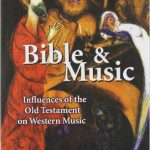
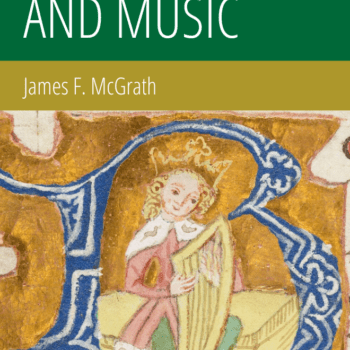
%20(528%20%C3%97%20800%20px)%20(660%20%C3%97%201000%20px).png?width=250&height=379&name=Copy%20of%20PALSave%20Book%20Cover%20Concepts%20(Ebook%20Cover)%20(528%20%C3%97%20800%20px)%20(660%20%C3%97%201000%20px).png) What do works like Handel’s “Messiah” and Bach’s “Passions” have in common with contemporary songs like Leonard Cohen’s “Hallelujah” or Kendrick Lamar’s “How Much a Dollar Cost?”
What do works like Handel’s “Messiah” and Bach’s “Passions” have in common with contemporary songs like Leonard Cohen’s “Hallelujah” or Kendrick Lamar’s “How Much a Dollar Cost?”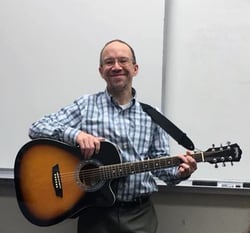 McGrath was one of the first open textbook authors to apply for and receive a PALSave Textbook Creation Grant from PALNI in 2021. Offered to faculty from PALNI-supported institutions, the grant allows educators to develop open textbooks that are freely available online, making them part of a nationwide effort to reduce the cost of course materials for college students. Financed with
McGrath was one of the first open textbook authors to apply for and receive a PALSave Textbook Creation Grant from PALNI in 2021. Offered to faculty from PALNI-supported institutions, the grant allows educators to develop open textbooks that are freely available online, making them part of a nationwide effort to reduce the cost of course materials for college students. Financed with 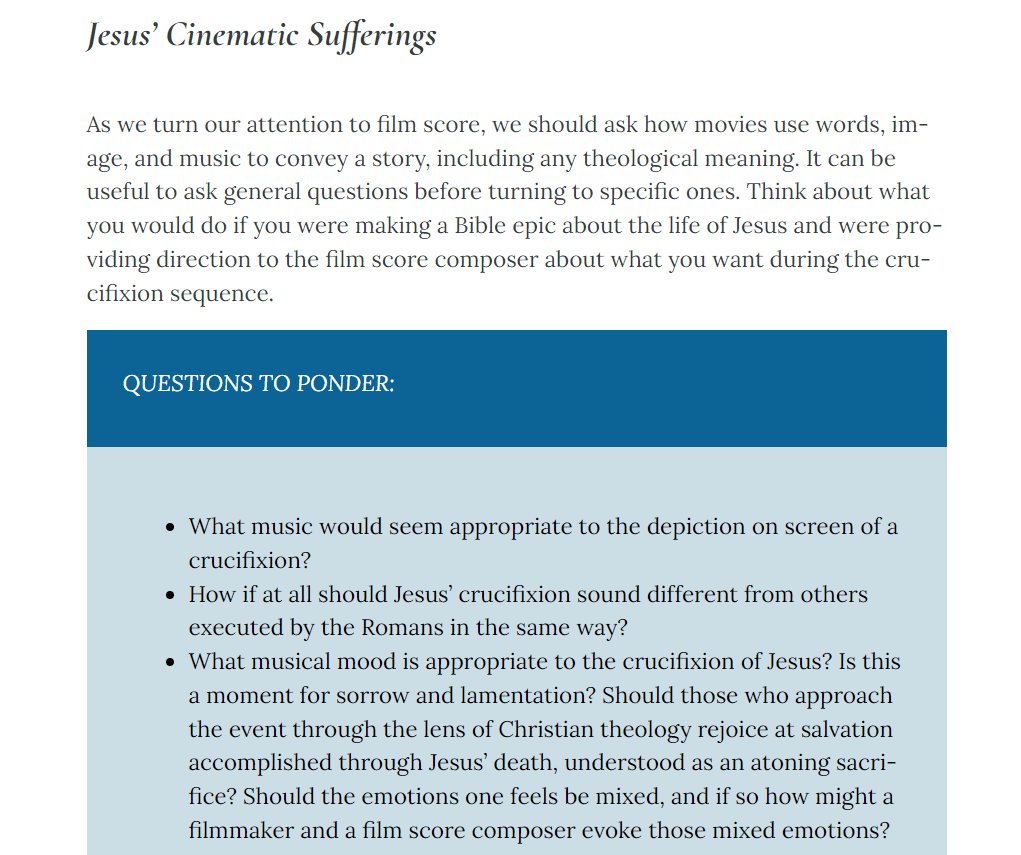 The Private Academic Library Network of Indiana (PALNI) is a non-profit organization that supports collaboration for library and information services for 24 colleges, universities and seminaries throughout the state. From its inception in 1992, the PALNI collaboration has been a key avenue for its supported institutions to contain costs while providing more effective library services. More recently, PALNI has adopted a model of deep collaboration that pools resources and people as a tool to expand services while keeping costs down. PALNI’s board of directors, composed of all 24 library deans and directors from the supported organizations, convened a Future Framing Task Force in 2019 to address ongoing demographic challenges in higher education. The board has escalated this work in the wake of COVID-19, as the consortium seeks to manage the increased need for online support while reducing costs. Simultaneously, PALNI is expanding collaboration within its institutions and with external library partners to address challenges and build cost-effective services.
The Private Academic Library Network of Indiana (PALNI) is a non-profit organization that supports collaboration for library and information services for 24 colleges, universities and seminaries throughout the state. From its inception in 1992, the PALNI collaboration has been a key avenue for its supported institutions to contain costs while providing more effective library services. More recently, PALNI has adopted a model of deep collaboration that pools resources and people as a tool to expand services while keeping costs down. PALNI’s board of directors, composed of all 24 library deans and directors from the supported organizations, convened a Future Framing Task Force in 2019 to address ongoing demographic challenges in higher education. The board has escalated this work in the wake of COVID-19, as the consortium seeks to manage the increased need for online support while reducing costs. Simultaneously, PALNI is expanding collaboration within its institutions and with external library partners to address challenges and build cost-effective services. 